The Corsair A115 CPU Cooler Review: Massive Air Cooler Is Effective, But Expensive
by E. Fylladitakis on January 22, 2024 10:00 AM EST- Posted in
- Cases/Cooling/PSUs
- Corsair
- CPU cooler
- Air Cooling
Testing Results, Maximum Fan Speed
To begin with, we are taking a look at the Corsair A115 with its stock 140 mm fans running at their maximum speed. Both fans run at exactly 1600 RPM, suggesting exceptional quality control.
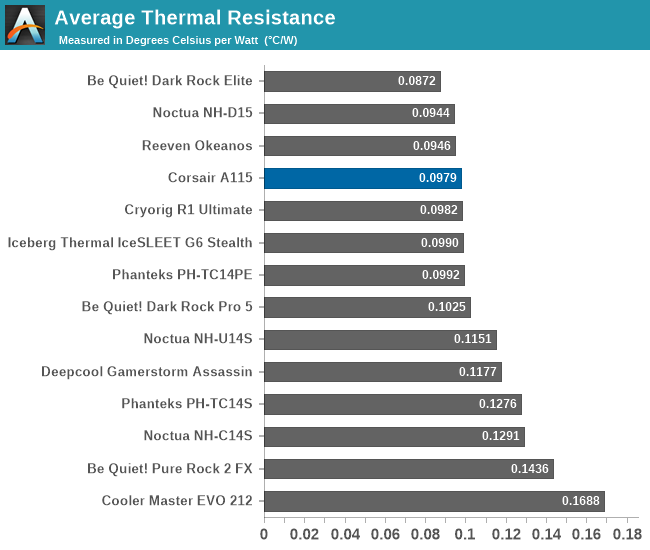

| Core Temperature, Constant Thermal Load (Max Fan Speed) |
The performance data of the Corsair A115 places it as a strong contender in the high-end air-cooling market, with its thermal resistance in line with many competitive products. With an average thermal resistance of 0.0979 °C/W at maximum fan speed, it shows adeptness in handling high thermal loads, even though it may not be the top performer in every scenario. The cooler is particularly effective under heavier loads, aligning with its design for demanding CPU applications, yet seems to struggle to keep performance figures high when the load is low.
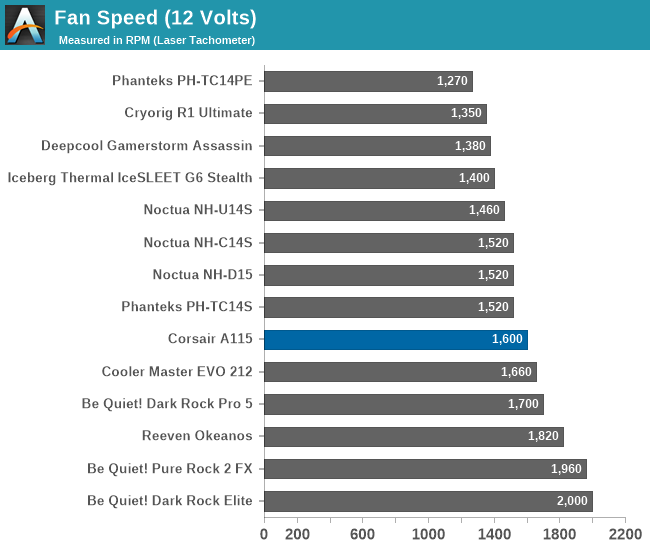
The A115's fans and design manage to keep noise levels relatively low. There is little-to-no turbulence noise, suggesting both low airflow resistance and intended design. At full speed, the noise level reaches 37.2 dB(A), which is quite manageable, especially considering the cooler's dual 140 mm fan setup. This level of noise, albeit not the quietest, is commendable for a cooler operating at this capacity, indicating a good balance between cooling efficiency and noise control.
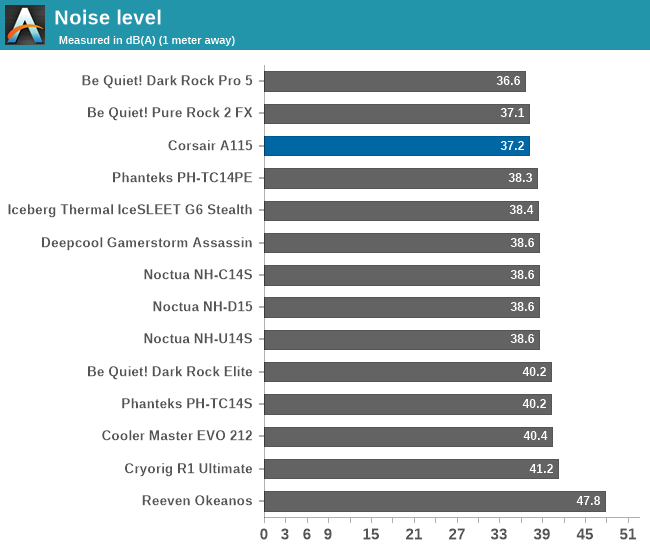
Testing Results, Low Fan Speed
In this test we are switching things up a bit, taking a look at the cooler’s performance with the AF140 fans taken down to half speed.
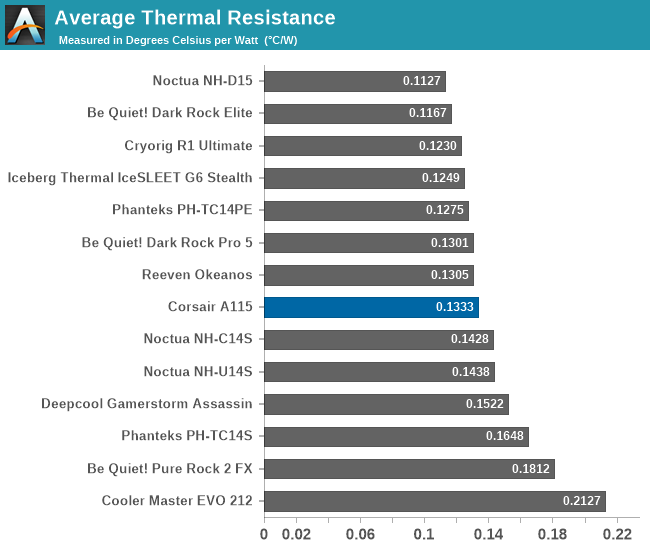
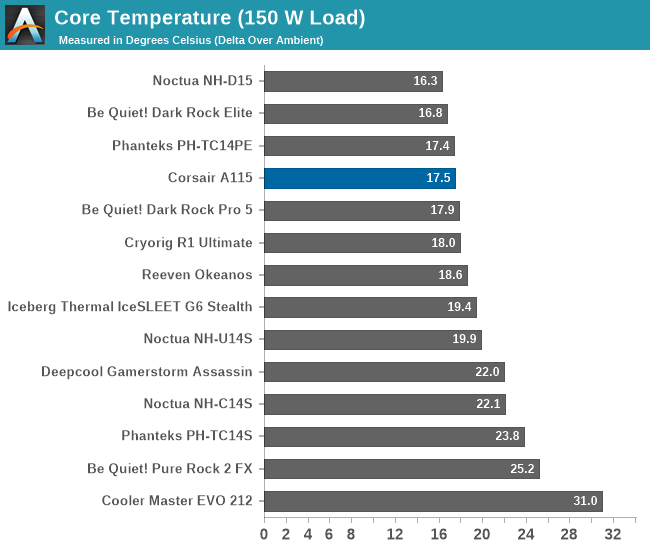
| Core Temperature, Constant Thermal Load (Low Fan Speed) |
Lowering the fan speed of the Corsair A115 to 800 RPM inevitably affects its thermal performance, albeit slightly more than one might expect theoretically. With an average thermal resistance rising to 0.1333 °C/W at this reduced speed, the cooler's performance remains excellent, but it does lose some competitive edge against major rivals in terms of raw thermal efficiency. While still performing admirably, it doesn't hold the top position in thermal performance charts, and its acoustic performance under these conditions becomes an important factor.
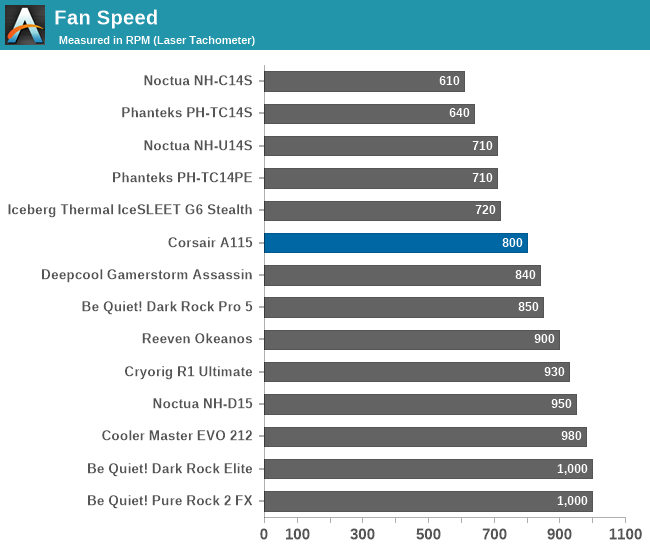
At this 800 RPM speed, the noise level of the A115 drops to 32.6 dB(A). This level is very quiet, barely noticeable in typical home office environments. The cooler becomes virtually undetectable except in extremely quiet settings, where there are no other sources of noise. Regardless, that kind of performance is not out-of-reach for most of its direct competition.
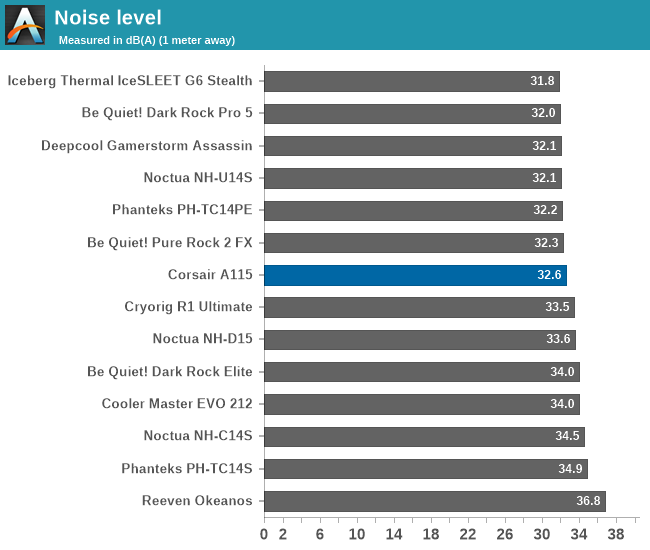
Thermal Resistance VS Sound Pressure Level
During our thermal resistance vs. sound pressure level test, we maintain a steady 100W thermal load and assess the overall performance of the coolers by taking multiple temperature and sound pressure level readings within the operating range of the stock cooling fans. The result is a graph that depicts the absolute thermal resistance of the cooler in comparison to the noise generated. For both the sound pressure level and absolute thermal resistance readings, lower figures are better.
The performance analysis of the Corsair A115 CPU cooler, when compared to industry benchmarks like Noctua's NH-D15 and Be Quiet!'s Dark Rock Elite, is quite revealing. At its maximum fan speed of 1600 RPM, the A115 matches the cooling performance of these renowned competitors, an impressive accomplishment considering its straightforward design. However, when the fan speeds are reduced to 800 RPM, the A115 tends to fall slightly behind in performance. The potential use of MagLev fans in the A115 could offer an advantage, potentially lowering its performance curve and giving it a slight edge over competitors in certain scenarios.


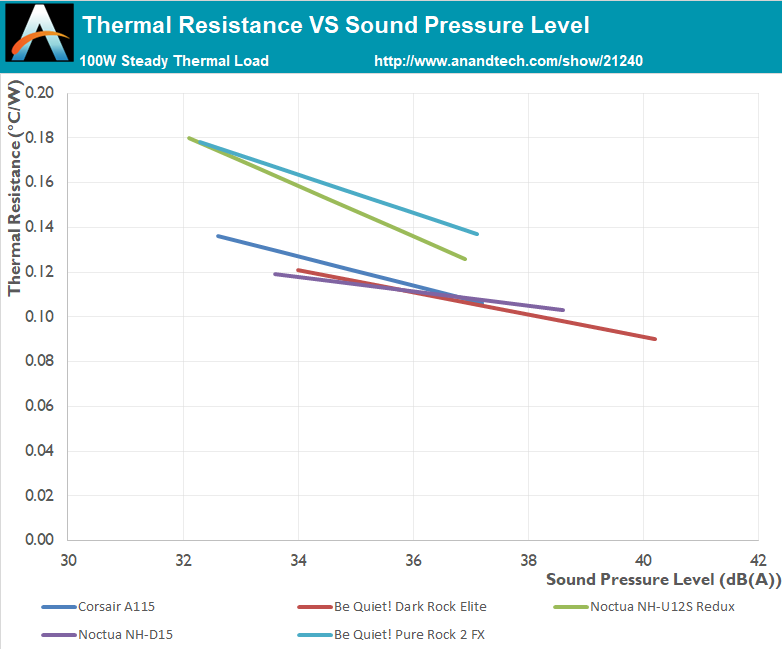








22 Comments
View All Comments
meacupla - Monday, January 22, 2024 - link
I'm confused as to what the main selling point of the A115 is. It doesn't offer any tangible benefit over a D15.No, not even those maglev fans are an enticing selling point.
erotomania - Monday, January 22, 2024 - link
"however, we hoped to see MagLev fans included. "What MagLev fans? :)
meacupla - Monday, January 22, 2024 - link
I admit I misread that part.IMO, FDB is better than maglev.
ballsystemlord - Tuesday, January 23, 2024 - link
Out of curiosity, why? What evidence did you use to form that opinion?meacupla - Tuesday, January 23, 2024 - link
it's purely anecdotal.At the top it doesn't get any better than Noctua's SSO bearings with Styrox fan.
Just below Noctua, there is Nidec/NMB FDB used in various designs.
Corsair's maglev sits in the marketing hype wagon. Better than DBB, SBB, or sleeve, but not as quiet as FDB.
Maglev bearing is a good idea in principle, but it's not beating 20+ years of refinement that FDB has gone through.
Maksdampf - Tuesday, January 23, 2024 - link
As far as i know Maglev is a Marketing Name by SUNON, one of the biggest Fan manufacturers in the world and has beend around since at least 20 years (1999 in fact). I have had Sunon Maglev Fans on my Pentium3 already.Corsair is just copying old and proven taiwanese tech here for which the Patents probably expired just recently. But they are not only copying the tech but also the Brand line "Maglev", which i find quite impudent. If Sunon hat their brand names protected well enough in the US, they would have a really good case here against the worlds biggest Brand of riddiculously overpriced Fans.
meacupla - Tuesday, January 23, 2024 - link
I know of Sunon. I hated their fans because they were always loud at the bearing level.If Corsair copied their maglev bearing design, they sure haven't improved upon it.
If you are that familiar. Back in the P3 days, the fan to get was Panaflo Low/Med model with their hydrodynamic bearings. Although NMB and Delta existed back then, they were not a good choice for desktops at the time.
If you would also remember, HDB was such a game changer, that it spawned a bunch of copies that didn't infringe on Panasonic's patent for it. This includes SSO and FDB.
HideOut - Wednesday, January 24, 2024 - link
And if Sunon didnt get sued by train companies that started maglev what, 40 years ago?MamiyaOtaru - Tuesday, January 23, 2024 - link
got 6 Corsair maglev fans in my computer. In a couple years two of them have started grinding, becoming unbearably loud. Replaced one, will do so with the second soon. By contrast, the 6 FDB fans in my computer from 2007 are all still going and sound fine, though there's one that I have to start spinning manually now (won't start itself) after which it spins fine. All in all a lot better result.Might just replace all the maglev fans with FDB instead of waiting for the next one to croak
MamiyaOtaru - Tuesday, January 23, 2024 - link
my old FDB fans are Scythe S-Flex fwiw. Not made anymore afaik but I'm sure there's something equivalent, from them or someone else